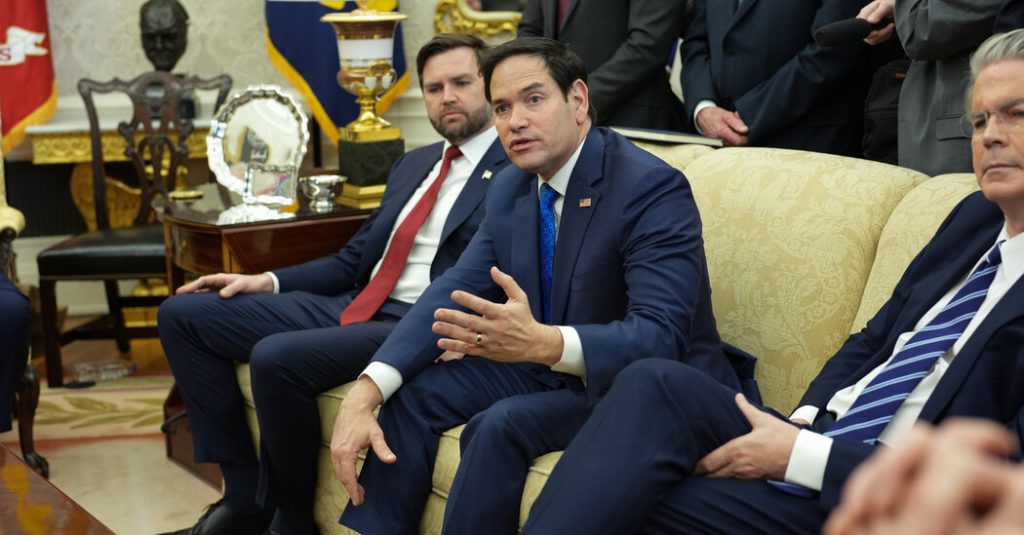A Heated Exchange in the Oval Office
The diplomatic tension between the United States and Ukraine reached a boiling point during a recent televised meeting in the Oval Office. President Trump and Vice President JD Vance publicly criticized Ukrainian President Volodymyr Zelensky, who was advocating for U.S. security guarantees in any potential ceasefire agreement with Russia. Zelensky’s passionate defense of Ukraine’s position, which included highlighting Russia’s aggression since 2014, was met with frustration from the American leaders. Vice President Vance interrupted Zelensky, calling his remarks “disrespectful” and chastising him for not showing enough gratitude for U.S. support. President Trump further escalated the situation, raising his voice and accusing Zelensky of “gambling with World War III.” The exchange, which took place in front of reporters and cameras, shocked many observers and sparked widespread debate about the administration’s approach to Ukraine.
Rubio Defends Trump’s Stance Amidst Criticism
Secretary of State Marco Rubio quickly came to the defense of President Trump and Vice President Vance, dismissing criticism of their handling of the situation. Appearing on ABC’s This Week, Rubio accused Zelensky of repeatedly trying to “Ukraine-splain” every issue and confronting Vice President Vance in a way that was unproductive. Rubio expressed puzzlement at the backlash against the administration, calling it “absurd” and arguing that Trump’s efforts to bring peace to the region were being unfairly criticized. He emphasized that Zelensky’s actions had hindered Trump’s peace initiative and suggested that both Zelensky and the administration’s critics needed to recognize that the United States was “trying to help” Ukraine. Rubio even went so far as to suggest that if Trump were a Democrat, he would be considered for a Nobel Peace Prize for his efforts.
Democrats Push Back Against Rubio’s Defense
Rubio’s strong defense of the administration has drawn sharp criticism from Democratic lawmakers, including some of his former Senate colleagues. Senator Chris Van Hollen of Maryland, who previously supported Rubio’s nomination as Secretary of State, expressed regret over that decision during an appearance on Fox News Sunday. Van Hollen noted that as a senator, Rubio had acknowledged Russia’s role as the aggressor in the war and would never have accused Zelensky of being a dictator, as Trump has done. Van Hollen accused Rubio of “parroting the president’s position” rather than standing up for American values and principles, as he once did. Similarly, Senator Chris Murphy of Connecticut, a vocal critic of the Trump administration, called Rubio “a great disappointment” to many of his former Senate peers.
Rubio’s Consistent Support for Ukraine Comes Under Scrutiny
Despite the recent tensions, Rubio has historically been a strong supporter of Ukraine. In 2022, when Russia launched its invasion, Rubio was among the first to call for robust U.S. support for Ukraine. Just days after the invasion began, he expressed frustration on MSNBC that the U.S. was not doing more to assure Ukrainians that it would stand with them “as long as they are willing to fight.” In 2023, he criticized Florida Governor Ron DeSantis for downplaying the conflict as a mere “territorial dispute” and for suggesting that the U.S. should avoid further entanglement. Rubio argued that Russia’s aggression posed a direct threat to global stability and warned that if the U.S. and its allies wavered in their support, it could embolden other authoritarian regimes, such as China, to pursue similar territorial ambitions.
Broader Implications: The China Factor
Rubio’s concerns about the conflict in Ukraine extend beyond Europe. He has repeatedly warned that if Russia succeeds in expanding its territory by outlasting the resolve of Western nations, it would set a dangerous precedent for China. Rubio has argued that China, which has long claimed Taiwan and other territories, could interpret Western inaction as a green light to pursue its own territorial ambitions through military force. “The message would be pretty clear,” Rubio said. “If you want to invade a smaller neighbor and take their land, then you can do it, and there won’t be many consequences for it.” This line of reasoning reflects Rubio’s broader view of the Ukraine conflict as a critical test of the international order and the ability of democratic nations to stand up to authoritarian aggression.
Conclusion: The Bigger Picture
The heated exchange in the Oval Office and the subsequent debate over Rubio’s defense of the administration highlight the deep divisions in Washington over how to handle the Ukraine crisis. While Rubio and the Trump administration argue that their tough approach is necessary to prevent further conflict and hold Zelensky accountable for his actions, critics contend that the public display of hostility toward a wartime leader undermines Ukraine’s morale and damages U.S. credibility on the global stage. As the conflict in Ukraine continues to unfold, the stakes remain high—not just for the people of Ukraine but for the broader balance of power in Europe and beyond. Rubio’s role in shaping U.S. policy will undoubtedly be closely watched, as will his ability to navigate the complexities of diplomacy in such a polarized political climate.


